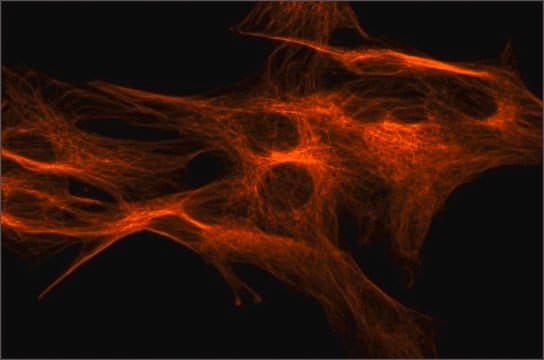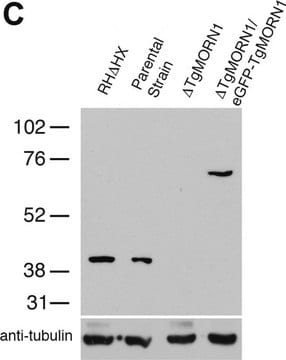F2043
Anti-β-Tubulin−FITC antibody, Mouse monoclonal
clone TUB 2.1, purified from hybridoma cell culture
Synonyme(s) :
Monoclonal Anti-β-Tubulin
About This Item
Produits recommandés
Source biologique
mouse
Niveau de qualité
Conjugué
FITC conjugate
Forme d'anticorps
purified from hybridoma cell culture
Type de produit anticorps
primary antibodies
Clone
TUB 2.1, monoclonal
Forme
buffered aqueous solution
Poids mol.
antigen 55 kDa
Espèces réactives
human, rat, frog, moth, mouse, plant, rabbit, chicken, bovine, wheat, sea urchin, hamster
Conditions de stockage
protect from light
Technique(s)
direct immunofluorescence: 1:25 using cultured BHK cells
Isotype
IgG1
Conditions d'expédition
dry ice
Température de stockage
−20°C
Modification post-traductionnelle de la cible
unmodified
Informations sur le gène
human ... TUBB(203068) , TUBB1(81027) , TUBB1(81027) , TUBB1(81027) , TUBB1(81027) , TUBB2A(7280) , TUBB2A(7280) , TUBB2A(7280) , TUBB2A(7280) , TUBB2C(10383) , TUBB2C(10383) , TUBB2C(10383) , TUBB2C(10383)
mouse ... Tubb1(104068) , Tubb1(104068) , Tubb1(104068) , Tubb1(104068) , Tubb2a(22151) , Tubb2a(22151) , Tubb2a(22151) , Tubb2a(22151) , Tubb2c(227613) , Tubb2c(227613) , Tubb2c(227613) , Tubb2c(227613) , Tubb3(22152)
rat ... Tubb2(29212) , Tubb2(29212) , Tubb2(29212) , Tubb2(29212) , Tubb2c(296554) , Tubb2c(296554) , Tubb2c(296554) , Tubb2c(296554)
Vous recherchez des produits similaires ? Visite Guide de comparaison des produits
Description générale
Spécificité
Immunogène
Application
- in the evaluation of the status of the meiotic spindle and the arrangement of chromosomes
- in immunofluorescence studies
- in immunofluorescence microscopy
- in spindle and chromosome imagery(6)
Actions biochimiques/physiologiques
Forme physique
Clause de non-responsabilité
Vous ne trouvez pas le bon produit ?
Essayez notre Outil de sélection de produits.
Code de la classe de stockage
12 - Non Combustible Liquids
Classe de danger pour l'eau (WGK)
nwg
Point d'éclair (°F)
Not applicable
Point d'éclair (°C)
Not applicable
Certificats d'analyse (COA)
Recherchez un Certificats d'analyse (COA) en saisissant le numéro de lot du produit. Les numéros de lot figurent sur l'étiquette du produit après les mots "Lot" ou "Batch".
Déjà en possession de ce produit ?
Retrouvez la documentation relative aux produits que vous avez récemment achetés dans la Bibliothèque de documents.
Les clients ont également consulté
Notre équipe de scientifiques dispose d'une expérience dans tous les secteurs de la recherche, notamment en sciences de la vie, science des matériaux, synthèse chimique, chromatographie, analyse et dans de nombreux autres domaines..
Contacter notre Service technique











